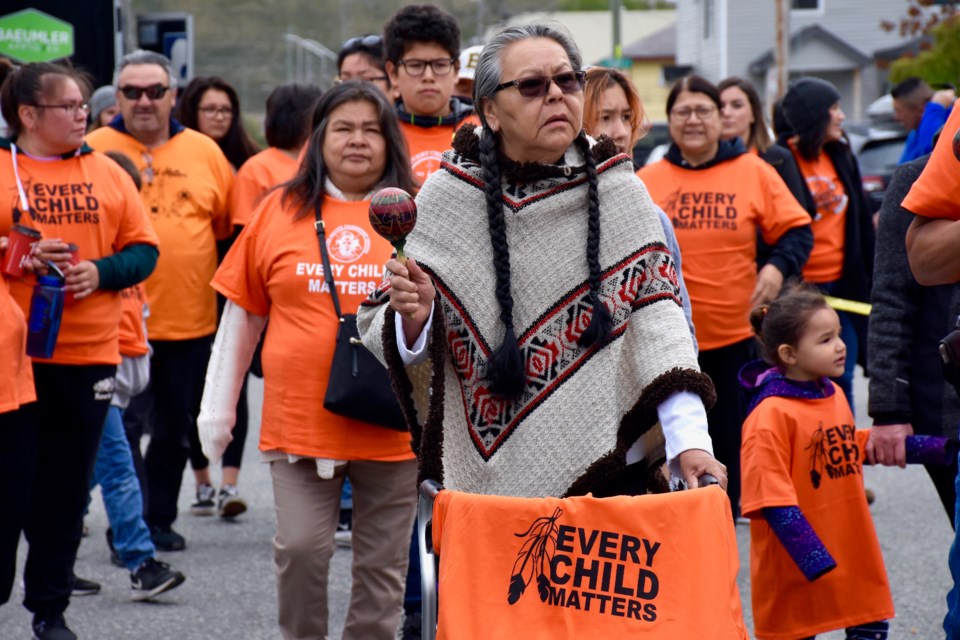Sophie Gunner-Sackabuckskum and Marcia Chum, whose families were impacted by the residential school system, say they're trying to break the cycle of intergenerational trauma.
Gunner-Sackabuckskum and Chum, who attended the Orange Shirt Day walk in Timmins last year, shared how their lives have been affected by the residential school system.
Gunner-Sackabuckskum's mother Jane was a residential school survivor.
Jane went to St. John’s School in Chapleau at the age of four after her mother, Gunner-Sackabuckskum’s grandmother, died. Jane’s three sisters were also taken to a residential school. Gunner-Sackabuckskum’s mother stayed at the school until she was 14, then she was transferred to Bishop Horden Hall School, a residential school in Moose Factory.
“The residential school and colonialism have such an impact on who I am today,” Gunner-Sackabuckskum said. “Even it impacts me today. I don’t want this cycle of violence to go on anymore. I’m trying to stop those cycles and I have to do my own healing.”
Growing up, Gunner-Sackabuckskum heard about her aunts but it wasn’t until she was in her 30s that she got to meet them. Last summer, she met a cousin who visited from Orillia. Some of her cousins and aunts were also a part of the Sixties Scoop.
“I never met my cousins on my mother’s side because (my aunts) were taken away to residential school so I never got to meet them,” she recalled. “And it’s really sad because those are our blood relatives and we don’t even know each other. It really, really fractured our family systems.”
On her paternal side, the situation was different. Her family moved from Moose Factory and went to live on the land to avoid being taken to a residential school. As a result, they managed to preserve their traditions and knew their history and culture, Gunner-Sackabuckskum said.
“I know all my aunties, all my cousins from my dad’s side, I know them really well. We had healthy relationships, we had healthy kin relationships,” she said. “And my grandmother taught us all about the land, how we live with the seasons. In the summertime, she would take us net fishing and we would go berry picking. That was a side my grandmother didn’t go to a residential school, she knew everything about the land.”
“But I didn’t know my mother’s side, it was like a mystery,” Gunner-Sackabuckskum added.
She's is glad she was able to reconnect with her maternal aunts and cousins, and that Orange Shirt Day is marked across the country as a way to raise awareness among people, especially the younger generation.
Phyllis Webstad, whose story inspired the Orange Shirt Day, was taken into a residential school in 1973. Gunner-Sackabuckskum pointed out how at that time she was being sent from Moose Factory to attend a high school in Timmins.
“If you look at the time frame, it wasn’t very long ago,” she said. “It hasn’t been a whole lot of time to do the healing.”
Marcia Chum's father, Peter Sackaney, attended two residential schools: St. Joseph’s in Thunder Bay and St. Anne’s in Fort Albany. His mother and grandmother were also placed in residential schools.
Now, Sackaney gives presentations in universities about his experience and educates people about residential schools.
“Today, many survivors are immobilized, stuck with memories they cannot forget, attempting to drown the ugliness of their thoughts in the world of alcohol abuse,” he wrote in a Facebook post. “I am healing ... I am still working on forgiving. It's a very slow process … I am so far from where I want to be, but I strive to survive very slowly.”
Chum’s mother didn’t attend a residential school but she was taken away from her family and boarded with another family in Kapuskasing. Because Chum’s parents struggled with drug and alcohol addictions as a result of what had happened to them, Chum said she witnessed violence in her home and ended up in foster care.
She said she was a high school drop-out, became pregnant at 18, and was a single mother. Once her father started speaking up about what had happened to him and she started learning about residential schools, Chum said she understood she and her siblings were following the same direction as her parents and picked up the same coping mechanisms like alcohol or drugs.
“That gave me an identity, a different kind of outlook on my life and who I was as an Indigenous woman. So, I started healing, learning about my culture, my medicine, ceremonies,” she said in a phone interview.
Many Indigenous people lost connection with their identity because of residential schools and it’s a reason why there’s a high rate of crime, addiction and mental health issues among them, Chum said.
“If someone had told me the history of our people and what had happened with my parents, I think my life would’ve made more sense as to why it was the way it was and why I was struggling with who I was as an Indigenous person,” she said.
Chum has three sons and she told them what happened to their grandfather. Her parents were also musicians, so Chum used music as a way of healing.
“I’m proud to be Indigenous," she said. "I come from a long line of survivors. I’m empowered by that. My people are strong resilient people."



